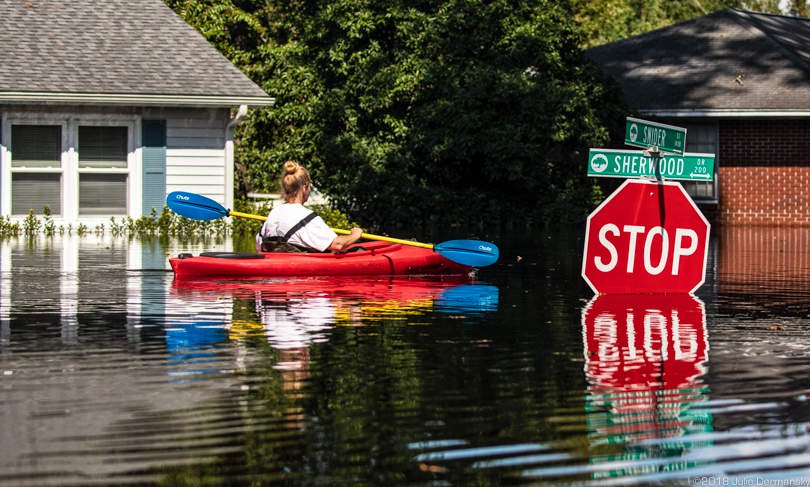
South Carolina was spared the worst of Hurricane Florence’s fury when the storm made landfall in North Carolina on September 14, but did not escape its catastrophic impacts. Nearly two weeks later, the state was still contending with historic flooding.
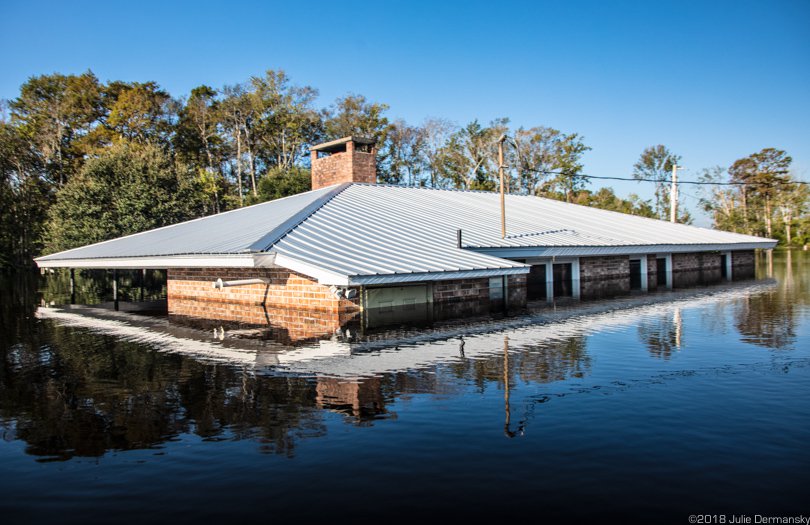
Florence lingered over the Carolinas, dumping more than 30 inches of rain in some areas. Five rivers and the IntraCoastal Waterway crested several feet above major flood stage, resulting in flooding that will last for weeks to come in parts of South Carolina. Cities and towns on its northern coast are experiencing the worst of it, where standing water remains in buildings along the Intracoastal Waterway and near riverbanks deep into the Carolinas.
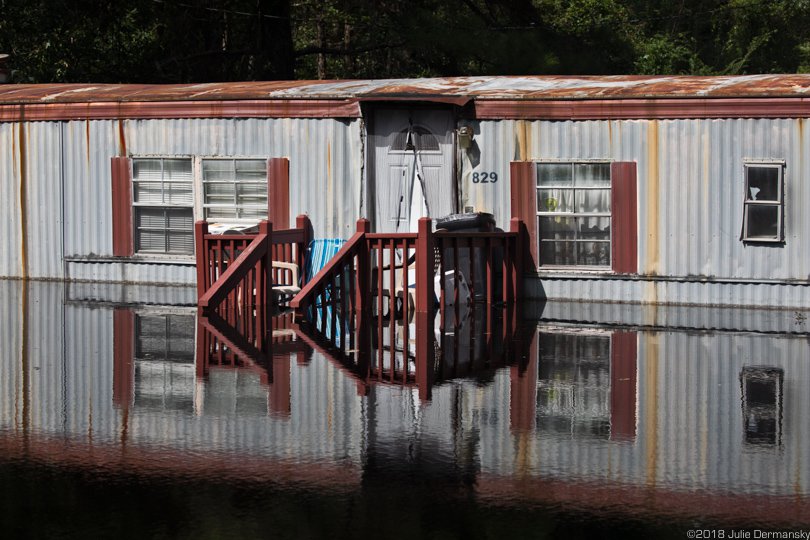
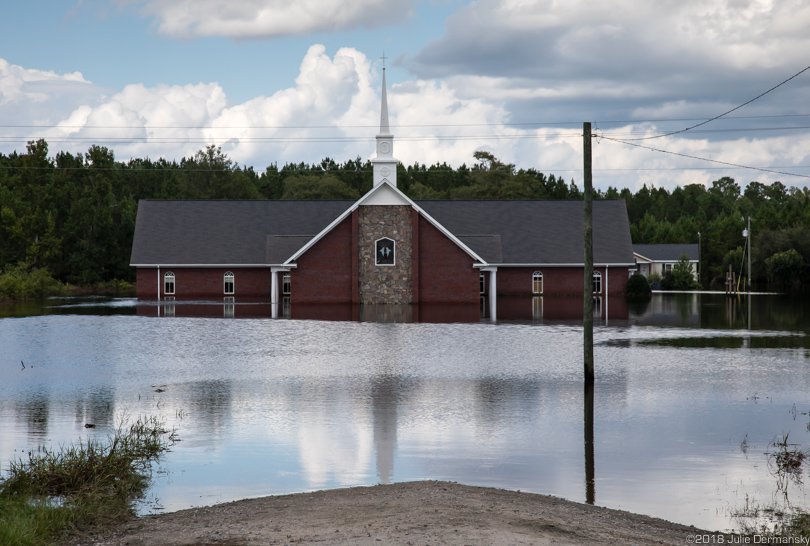
Jane and Chris Ochsenbein, owners of Gator Bait Adventure Tours in Myrtle Beach, South Carolina, took me on a kayak tour of flooded areas 10 days after the storm hit the coast.
On September 26, we met up with April O’Leary, a program officer for Winyah Rivers Foundation and the Waccamaw Riverkeeper program, in Conway, a city about 15 miles from South Carolina’s coast.
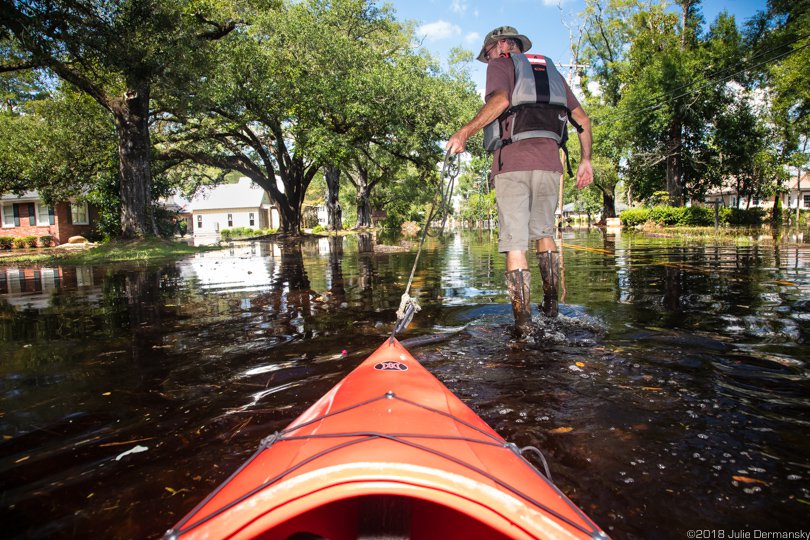
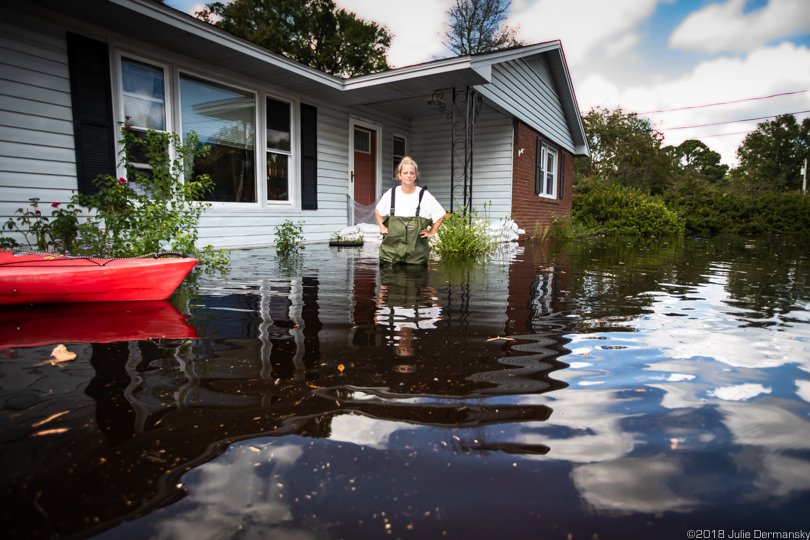
We paddled our way to her home in Conway’s Sherwood neighborhood the day that the Waccamaw River crested, reaching 21.16 feet, 7 feet over major flood stage. O’Leary later told me that level set a new record by more than three feet. The previous record, 17.89 feet, was set following Hurricane Matthew just two years earlier.
The streets were quiet. Everyone had evacuated before the flooding became too dangerous, as far as O’Leary knows. The only people we crossed paths with were checking their homes like she was.
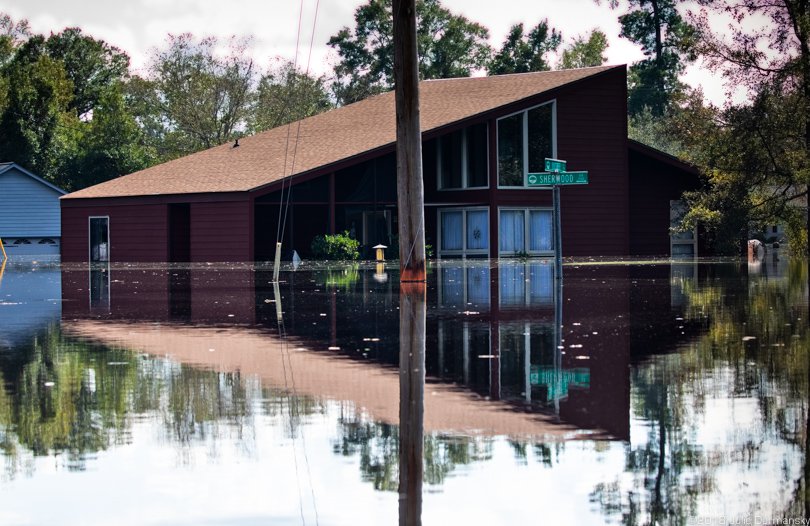
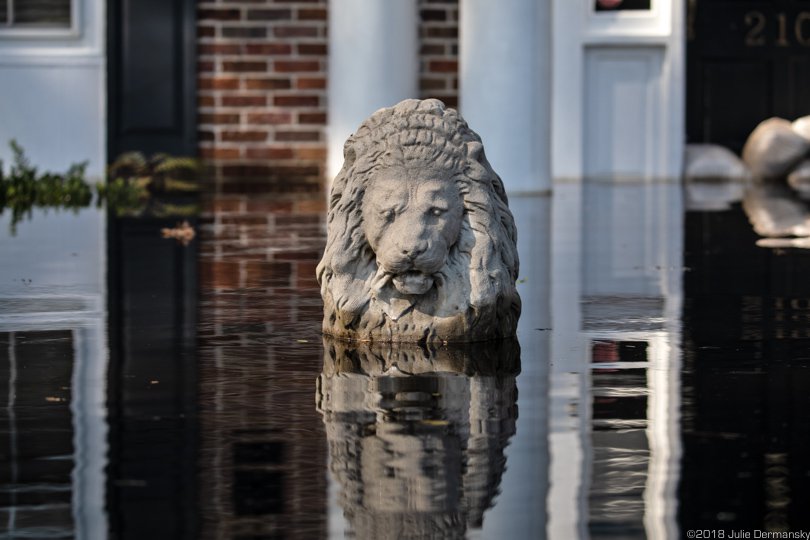
I first met O’Leary and the Ochsenbeins in 2016 after Hurricane Matthew’s floodwaters affected areas along the Waccamaw River and Intracoastal Waterway, but that storm didn’t come close to flooding O’Leary’s home. With Florence, however, she finds herself in a new dual role: explaining to the media the environmental issues that affect the Winyah rivers basin, and dealing with being a flood victim herself.
The day before I caught up with O’Leary, she was featured on a local news program as she rescued monarch butterflies from her home in laundry baskets. She plans to care for them, and then release them in a nearby flood-free area where there are plenty of flowers.
The Ochsenbeins described living through Florence’s aftermath as being in the middle of a slow-motion disaster. Their home is on high ground in Socastee, just west of Myrtle Beach, and didn’t flood. But many of their friends’ and neighbors’ homes did. They have been posting videos of the area on Facebook while monitoring the floodwaters and helping others by lending them kayaks to reach their homes and assess the damage.
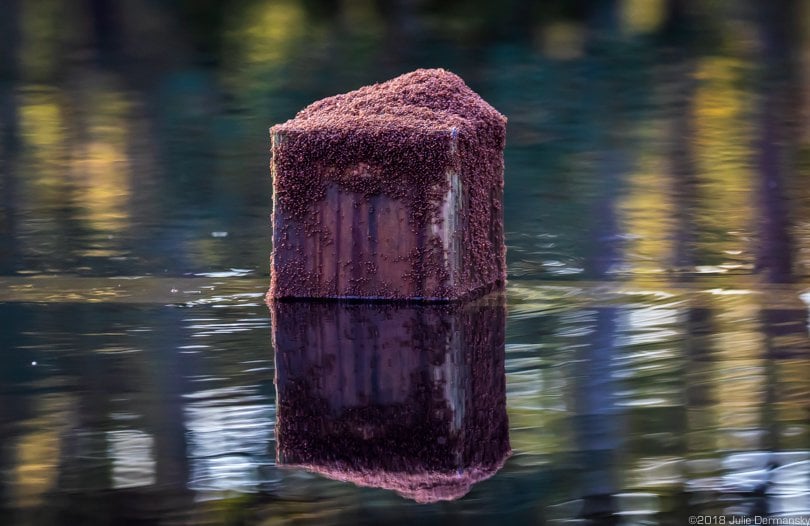
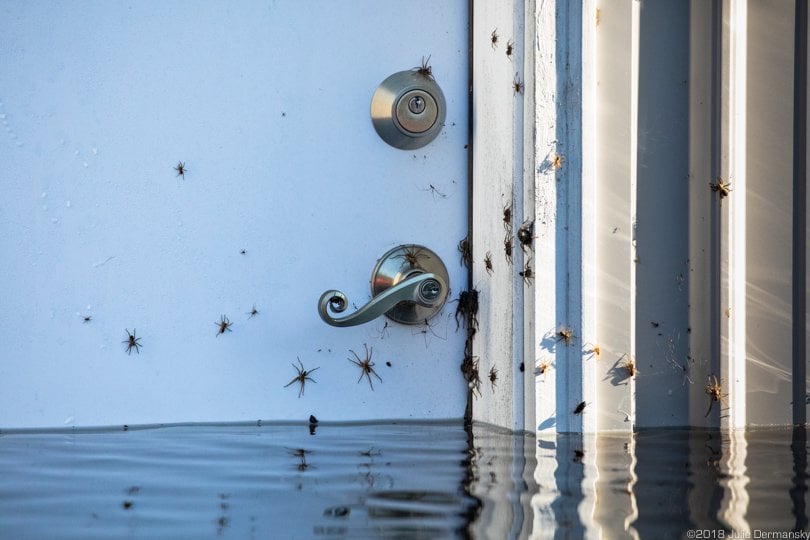
“[President] Trump visited Conway while embankments and aqua dams were frantically being installed to shore up the coal ash ponds that were the biggest threat to our community,” Jane Ochsenbein told me. It bothered her that Trump didn’t acknowledge the coal industry’s threat to the area, and only a few days after, he went to Wheeling, West Virginia (her husband Chris’s hometown), to promote coal and push for the rollback of regulations there.
“It’s a hopeless feeling when your public officials deny science and the extensive costs that go along with that denial,” Jane said. “Failing to deal with climate change is already costing lives.” She is disheartened by having a president who promotes fossil fuels, and local officials who continue to ignore flood maps while allowing new developments in wetlands. “Failing to plan is going to cost more lives and property,” she said. “We have to do better, from regulating industries to eliminate their waste and disposing of it properly, to stopping developments in high-risk flood areas.”
The Ochsenbeins see the writing on the wall. Three times in the last four years they have had to close their business for extended periods of time due to historic flooding. Though they love the area where they have lived and built their company over the last 20 years, they are considering relocating to higher ground.
“We might move to the mountains near Asheville,” Jane said. I asked about the massive fires there last year. “No place is safe from climate change, but the risk of fire in the mountains is not as bad as what we are dealing with now.”
The Trump administration recently acknowledged that temperatures will indeed continue to rise with increased greenhouse gas emissions. In its latest environmental impact assessment justifying Trump’s proposed pause to vehicle fuel efficiency standards, the National Highway Traffic Safety Administration (NHTSA) predicted that by 2100 the planet is on track to warm by 7 degrees Fahrenheit. Climate scientists have warned that temperature change would be catastrophic.
Instead of outright denying climate change, this draft statement accepts it as a given that can’t be stopped. The NHTSA document says that Obama’s earlier plan to improve fuel efficiency for cars and light trucks built after 2020 would not make a significant dent in global emissions and therefore in projected warming.
Michael MacCracken, a former senior scientist at the US Global Change Research Program for almost a decade, told the Washington Post: “The amazing thing is that they’re saying human activities are going to lead to this rise of carbon dioxide that is disastrous for the environment and society. And then they’re saying they’re not going to do anything about it.”
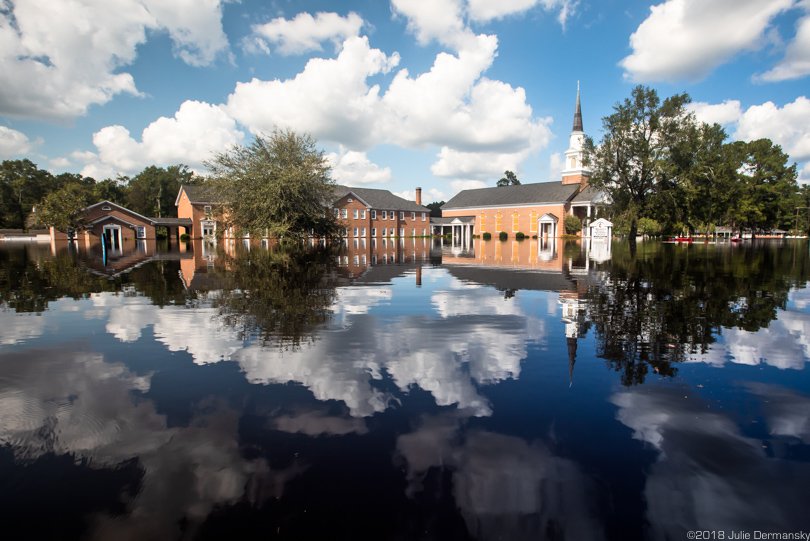
April O’Leary had a chance to meet President Trump when he visited Conway the week before the floodwaters arrived in the city. Her husband Patrick O’Leary, an airport deputy fire chief, led Trump on a tour of the same neighborhood we kayaked through. However, April doesn’t support Trump’s environmental policies and chose to stay away.
“Consoling communities by ignoring the impacts of climate change ensures these complex issues will never be resolved,” O’Leary told me. “It’s our responsibility to future generations to reconcile with the evidence and truth. The greatest threat to our rivers, water resources, and clean drinking water is thinking that it’s someone else’s problem.”
When we were done kayaking in the Sherwood neighborhood, we wiped ourselves down with antibacterial cleanser to prevent infections from possible inadvertent contact with the floodwater. Shortly after, we found out that millions of gallons of raw wastewater from a Conway sewage plant were released into the Waccamaw River earlier that day.
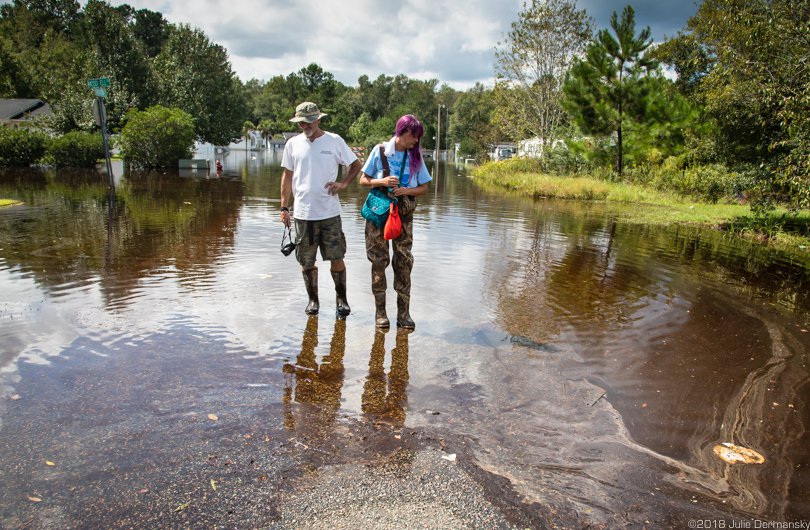
Spills like that are why the Ochsenbeins are keeping their business closed for now. Though there are no set pollution standards that regulate their tour guide operations to keep them or anyone else from using the area’s waterway, they don’t plan to start up their business again until the water’s bacteria levels are safe. Florence’s floodwaters have been contaminated by a range of hazardous and unhealthy materials common after floods: untreated sewage, oil and gas from flooded cars, and the added danger of waste from industrial hog and poultry farms.
On the bright side, the Ochsenbeins likely don’t have to worry about coal ash in the floodwaters around them since the nearby Granger storage pond wasn’t breached. North Carolina, however, wasn’t so lucky. The bulk of the coal ash from breached ponds there were washed into the Cape Fear watershed, just north of the Winyah Bay basin.
Truthout Is Preparing to Meet Trump’s Agenda With Resistance at Every Turn
Dear Truthout Community,
If you feel rage, despondency, confusion and deep fear today, you are not alone. We’re feeling it too. We are heartsick. Facing down Trump’s fascist agenda, we are desperately worried about the most vulnerable people among us, including our loved ones and everyone in the Truthout community, and our minds are racing a million miles a minute to try to map out all that needs to be done.
We must give ourselves space to grieve and feel our fear, feel our rage, and keep in the forefront of our mind the stark truth that millions of real human lives are on the line. And simultaneously, we’ve got to get to work, take stock of our resources, and prepare to throw ourselves full force into the movement.
Journalism is a linchpin of that movement. Even as we are reeling, we’re summoning up all the energy we can to face down what’s coming, because we know that one of the sharpest weapons against fascism is publishing the truth.
There are many terrifying planks to the Trump agenda, and we plan to devote ourselves to reporting thoroughly on each one and, crucially, covering the movements resisting them. We also recognize that Trump is a dire threat to journalism itself, and that we must take this seriously from the outset.
Last week, the four of us sat down to have some hard but necessary conversations about Truthout under a Trump presidency. How would we defend our publication from an avalanche of far right lawsuits that seek to bankrupt us? How would we keep our reporters safe if they need to cover outbreaks of political violence, or if they are targeted by authorities? How will we urgently produce the practical analysis, tools and movement coverage that you need right now — breaking through our normal routines to meet a terrifying moment in ways that best serve you?
It will be a tough, scary four years to produce social justice-driven journalism. We need to deliver news, strategy, liberatory ideas, tools and movement-sparking solutions with a force that we never have had to before. And at the same time, we desperately need to protect our ability to do so.
We know this is such a painful moment and donations may understandably be the last thing on your mind. But we must ask for your support, which is needed in a new and urgent way.
We promise we will kick into an even higher gear to give you truthful news that cuts against the disinformation and vitriol and hate and violence. We promise to publish analyses that will serve the needs of the movements we all rely on to survive the next four years, and even build for the future. We promise to be responsive, to recognize you as members of our community with a vital stake and voice in this work.
Please dig deep if you can, but a donation of any amount will be a truly meaningful and tangible action in this cataclysmic historical moment.
We’re with you. Let’s do all we can to move forward together.
With love, rage, and solidarity,
Maya, Negin, Saima, and Ziggy